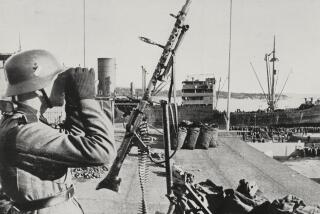Book Review : Young Girl’s Tale of WWII Invasion
- Share via
My Longest Night by Genevieve Dubos (Seaver Books: $9.95)
Written as a personal memoir by a woman who was a precocious 13-year-old at the time of the Normandy landing, “My Longest Night” was an immediate sensation in 1981.
Since then, there has been considerable controversy surrounding the story: the French aggrieved because the author left so many individual acts of bravery unmentioned; veterans of the 82nd U.S. Airborne Division disputed her recollection of the events described.
In her modest introduction to the translation, Dubos explains that she is not a military historian but merely relating incidents as she recalls them, aided by “the correspondence of several witnesses who lived through those times with me.”
Adding to the Interest
For American readers with a particular interest in recent French history, these arguments may add to the interest of the account. Familiar with “nonfiction” novels for the last 20 years, we’re not only tolerant of varnished truth but often prefer it to the raw facts. As practiced by some of our most distinguished authors, the technique has become not only respectable but a genre in itself.
Dubos’s tale is delivered in a style so direct and unaffected that the mot juste is “amateur” in the original sense of one who embarks upon a project motivated by love and conviction rather than for gain. To the reader of these plain unassuming sentences, vocabulary serviceable as a pitchfork, the plot a guileless chronology, questioning the authenticity of the material seems merely churlish. Though the book may have shortcomings as history, it offers a cruelly accurate and entirely genuine record of peasant life.
The writer’s family lived in a four-room cottage provided by the Paris-Cherbourg railway line for its employees. Their address was Level Crossing 104; three miles from the nearest village, deep in the Normandy lowlands, terrain so swampy that her father often punted along the tracks in a flat-bottomed boat. He was also permitted the use of another house--little more than a barn--on higher ground, where he looked after cattle for a prosperous local farmer. Despite these two jobs, the Duboscs were desperately poor; their tiny income continually depleted by the father’s alcoholism. Coldly indifferent to his wife and son, Dubos vented his rage on Genevieve, who lived in constant fear of his beatings.
A Drunk and Hero
Though until the night of the Allied invasion, her father had seldom showed himself to be anything more than a drunken brute, on that occasion he behaved with dogged heroism, saving several paratroopers from drowning in the marshes. Once rescued, the injured men were sheltered in the Dubos house, the group eventually augmented by a wounded German who was treated with the same decency as the liberators.
Once the Americans landed, life improved dramatically for the household. The soldiers were generous with their rations; kind to Genevieve and her brother, immensely grateful to the long-suffering mother and respectful of the miraculously, if only temporarily, reformed father. Later in 1944, Genevieve happened upon an American encampment where she was befriended by a French-speaking officer, so enchanting him with her singing voice that he offered to adopt her and send her to music school in the United States. By then in her early teens, she fell hopelessly in love with the man, finally persuading him to make her his wife instead of his ward. For a few months, she was deliriously happy for the first time in her life. As the bride-to-be of an American officer, she was treated with awed respect by her father.
Her happiness was pathetically short-lived. Answering a call for help from her younger brother whose foot had been caught by a piece of wire on the railway tracks, she ran to his aid and set off a land mine. Grievously injured, she survived to write this story, though her brother died of his injuries. While the fairy-tale ending of marriage to the American never materialized, Genevieve did achieve a small measure of joy, ending her sentimental story with a tribute to the paratroopers who contributed to the liberation of France.
More to Read
Sign up for our Book Club newsletter
Get the latest news, events and more from the Los Angeles Times Book Club, and help us get L.A. reading and talking.
You may occasionally receive promotional content from the Los Angeles Times.







